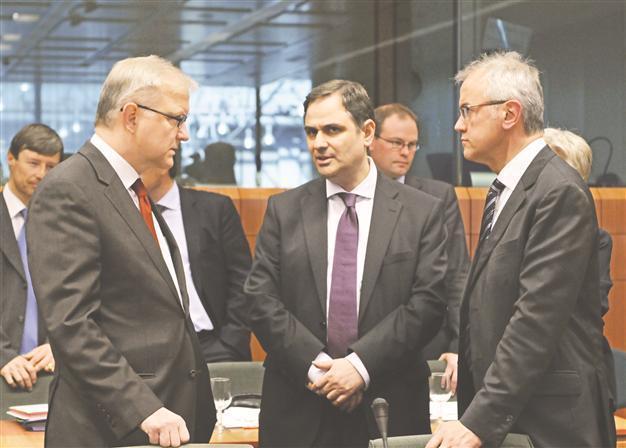Greece here to stay, eurozone chief says
BRUSSELS - Agence France-Presse

EU’s economic and monetary affairs commissioner Olli Rehn (L) speaks with Greek Finance Minister Sachinidis (C) on May 14 before the start of a ministers meeting. AFP photo
Leading eurozone powerbroker Jean-Claude Juncker has lashed out at “propaganda” suggesting that a politically-paralyzed
Greece would now exit the troubled currency.
“I don’t envisage, not even for one second, Greece leaving,” the head of the Eurogroup said after late May 14 talks among finance ministers in Brussels, during which he said the 17 eurozone partners unanimously affirmed their “unshakeable desire” to keep Athens in the club.
“This is nonsense, this is propaganda,” the Luxembourg premier insisted of what economists have baptized ‘Grexit.’ Such talk was only inflamed by Austrian finance minister Maria Fekter claiming that Greece would not only have to leave the eurozone but the
European Union itself.
Juncker, whose mandate at the head of the finance ministers’ forum ends in July, stressed that partners “will do everything possible” to prevent such an outcome.
Of the exit talk, he insisted that “absolutely no-one argued in that direction.” He said
Europe must “respect” Greek democracy, slamming “constant provocation” since May 6 elections returned a majority for anti-austerity or anti-
EU parties.
Greek President Carolos Papoulias has been holding last-ditch talks with party leaders, seeking to forge an emergency government and avoid the need for fresh elections next month. Juncker castigated “lectures” for Greece “day after day,” scolding high-ranking leaders when adding: “This is not the way to deal with partners, colleagues, friends and citizens in the EU.” Greece and the EU are locked in what respected analyst Sony Kapoor calls “a game of chicken.” The bargaining strength of far-left and far-right leaders in Athens has seen EU rhetoric harden -- Spanish Foreign Minister Jose Manuel Garcia-Margallo warning that membership of the eurozone club depends on “complying with the rules of the game.” European Commission chief Jose Manuel Barroso used the same metaphor on Italian television last week, while the German government reiterated on May 14 that parties must thrash out a “workable” majority that would respect the terms of a a second 130-billion bailout signed in March.
EU partners have already granted Greece 148 billion euros ($190 billion) of loans, and while Juncker said “this is not the time to relax” on budgetary consolidation and reforms, he nonetheless held out the possibility of re-negotiating timetables for actions set as conditions.
“We wouldn’t preclude a debate about an extension,” Juncker said, despite German Finance Minister Wolfgang Schaeuble stating that “it’s not about generosity” towards Greece.
The darkening mood has seen European shares sink and the euro tumble to its lowest point since January, as markets fret over the possible knock-on effects on the eurozone banking system in Spain and Italy. “A Greek exit might actually be a good thing for the eurozone in the long run,” said ETX Capital trader Markus Huber. Juncker also said Spain was ordered to “speed up” work on its banking sector, where bad debts after a property boom require costly repairs.
